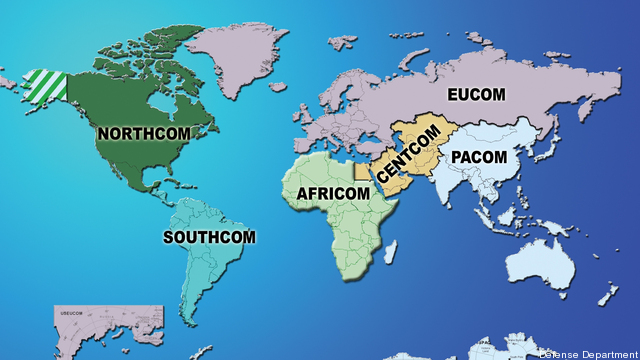Barack Obama has hidden his concern for terror threats and most often he has re-labeled it as an ‘overseas contingency operation’.
Then only recently did he give a speech at West Point explaining his foreign policy which he was forced to do for at least two reasons, the recent kidnappings and deaths at the hands of Boko Harem and the immediate release only a few days after the speech of the Taliban 5 from Guantanamo.
Okay, so where does that leave America for the next several years as Barack Obama has forced the shrinking of the United States footprint globally? Well, Barack Obama’s lack of policy and leadership with allies point to the very real possibility of NATO crumbling itself. This leaves China and Russia and especially the entire Shiite and Sunni world in a race for the top slots of globally power rankings.
In context, the lack of will and the aversion to colonialism at the hands of Barack Obama, simply removed the United States from the short list of the keepers of peace globally in six short years, something that experts predict will take at least fifteen years to ever begin to reverse, others predict as much as forty years and that is only if there is a collection of Reagan prodigies on the horizon. Not much hope so far.
One of the topic intelligence analyst with a real and candid background for saying what must be said is Michael Vickers. Here he is in his own assessment. Take it for your deep consideration.
WASHINGTON: If you want to understand why President Obama spoke so much about terrorism in his widely panned West Point speech, the head of Pentagon intelligence explained it pretty well today.
Click here to see the video of Vicker’s message.
Terrorism is and remains the top threat to the United States, Defense Undersecretary for Intelligence Mike Vickers said this morning at the Center for Strategic and International Studies. The most interesting, and some would say anomalous, threat assessment he offered: China comes in at number seven after Al Qaeda and its affiliates, the Syrian civil war, Russian “revanchism,” Iran, North Korea and what he called the “persistent volatility” across South Asia and the Middle East and North Africa.
That’s right, China appears to come seventh when the Intelligence Community is planning and advising President Obama and Defense Secretary Chuck Hagel. It makes sense when you consider the long-range goals China appears to have set itself and the absence of a direct confrontation — so far — between the two powers.
Now folks in the Intelligence Community may well tut tut and profess that they examine each situation as it occurs, but budgeting requires prioritization and here it is.
What does all this mean in aggregate to the Intelligence Community and the Pentagon? Vickers said, “[as] senior intelligence officials, we haven’t seen this range of challenges on an administration’s plate in our careers.” Not only is the range of threats geographically enormous and conceptually varied, they are, as Vickers noted, “these are highly asymmetric challenges.” In Pentagon parlance that means the United States military isn’t necessarily well prepared to cope with them. And there are a lot of them.
Is Mike Vickers arguing that the Intelligence Community needs to remain very well financed, even in this age of declining defense budgets? Sounds like!


